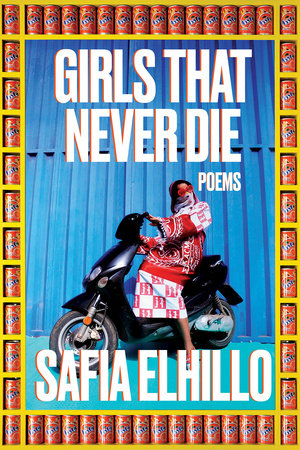Excerpt
Girls That Never Die
ORPHEUS Mold blooms on the yogurt, furring the edges
in ancient colors. My body is something I have worn
for other people. Even five years ago
I would not recognize myself today, married, gallon bags
of animal bone and corncobs in the freezer to boil for stock.
I am far away from the cities of my girlhood, cool concrete
of their stairwells. The new therapist wants a list of compliments
I’d give myself on behalf of those who love me,
and all I can come up with is
resourceful. For a time I believed
myself in love with Orpheus, which only meant I loved
what I could make if I were free from what happened to my body.
That man who would never touch me, kept distant and without danger
by the barriers of fiction. Then I believed the work would save me.
I have no real use now for those Greek myths, their dead girls,
women raped by men and animals. Today the door is locked. Today nobody
is outside. Muscle cramping mid-lap in the dark blue water.
Now I embroider flowers in dim colors in my new country of flowers,
clumsy stitches through the stencil of an orchid, remembering
my younger mouth pressed to a flute, unable to release the breath.
I’d liked that he was a musician, fingers long as spring onions.
As a child I ruined my sweaters, the sleeves tugged down to cover
my hand before touching any doorknob or handling coins.
Teenaged, loitering, urgently lonely. The cotton t-shirts curled
at their sliced hems. Now I am thick-fingered and practical
as my mother and her mother, smell of bleach against ceramic.
Gone is L’s humid little apartment, violent stain on the bathroom tile,
a bottle of crimson nail-polish shattered long ago and leaving
streaks like blood. Her dirty living room where I slept
for nights on end, though my own apartment was nearby, cleaner—
I can’t imagine them, the poems that softened the hearts of gods,
the poems that changed anything.
That night, metal of the fire escape against my bare legs, I accepted
my first cigarette and she allowed me to tell the entire story
without using the real words. The night cooling and gathered close.
The way nothing ever feels truly clean
in summer. And all I know about Eurydice
is that she died. My every other fact about her is about him.
YASMEEN i was born i was planted
at the rupture the root where land became ocean became land
anew i split from my parallel self i split from its shape refusing root in my fallow mouth
the girl i also could have been cleaving my life neatly
& her name / easy / i know the story & my name / taken from a dead woman
all her life / my mother wanted to remember / to fill an aperture with
a girl named for a flower cut jasmine in a bowl
whose oil scents all our longing
our mothers / our mothers’
petals wrung wilting
for their perfume garlands hanging from our necks
POMEGRANATE Because I am their daughter my body is not mine.
I was raised like fruit, unpeeled & then peeled. Raised
to bleed in some man’s bed. I was given my name
& with it my instructions. Pure.
Pure. & is it wasted on me? Every moment I do not touch
myself, every moment I leave my body on its back
to be a wife while I go somewhere above the room.
I return to the soil & search. I know it’s there. Buried
shallow, wrapped in rags dark with old & forgotten rust,
their discarded part. Buried without ceremony,
buried like fallen seeds.
I wonder about the trees: Date palms veined
through the fruit with the copper taste of cutting.
Guavas that, when slit, purple dark as raw meat.
I have to wonder, of course, about the blood orange,
about the pomegranate, splayed open, like something
that once was alive & remains.




